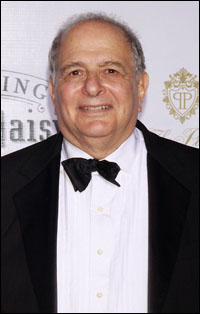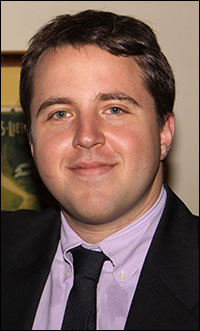

The complete script of Bad Jews is published in the April 2014 issue. It follows three cousins in a dispute over a deceased relative’s “chai.”
When he was 14, playwright Joshua Harmon went to see Alfred Uhry’s The Last Night of Ballyhoo and sent the author a two-page letter in pencil. Uhry wrote him back, saying, “If you want it badly enough, you can have a career in the theatre.” Fifteen years later, Uhry came to the opening night of Bad Jews, and last month, they sat down for coffee.
ALFRED UHRY: So, has there been any action on the good old play, Bad Jews?
JOSHUA HARMON: Yeah, it’s going to be done at a bunch of theatres next season.
If my mother were alive, she’d say, “Couldn’t you change the title to Good Jews”?
My grandmother asked the same thing. We got that a lot during the show. I didn’t invent it. The title refers to a very particular generation, and I think it makes some people uncomfortable.
Everybody I sent to see it loves it.
You sent your sister!
Yeah. She’s got two sons and a daughter, and she said, “It was them! How did he know?” It is uncanny what you did. And we’ve already talked about your doing the next one, and thinking, “I don’t know what I did.” That haunted me for years, and it was all my own making.
I think that happens to a lot of writers. The fear of everyone discovering you’re a fraud is pervasive.
But the thing is we’re not frauds. We do what we do. To know at your age now that you’ve written a good play and you’re a writer—that’s what’s important.
In Wendy Wasserstein’s biography, there’s this amazing passage in which she talks about when she enters a room, the two conflicting feelings she has, which are simultaneously thinking, “I’m better than everybody in this room,” and also thinking, “I’m a fraud. What am I doing in this room?”
I’m sorry you didn’t know her. You would have loved her, and she would have loved your play so much.
That means a lot. I love her plays.
The thing about those plays, if you talk to Wendy, that was her.
That seems like your plays, too.
Yeah, and clearly that girl, Daphna, is you. They’re all you, right?
They’re all you.
The hard thing is, I don’t know how many times one can go to that particular well.
I’d be so interested to hear about writing Driving Miss Daisy, because you wrote it from a place where you weren’t the Pulitzer Prize winner yet.
Well, I was where you are now. Scary as hell. But most of that’s hoops of your own making.
You get asked questions like, “Where did this play come from?” Which is such a rational question, but the act of writing is not rational. A whole collection of different things come into play. Like I remember being on the subway in 2006. I don’t know why, but I said to myself, “Oh my God. Melody is going to sing ‘Summertime.’” And I got off the subway and I wrote it in my notebook. I don’t know where it came from. I don’t know how it happened. I just knew. It’s not a rational act.
When you’re creative, it jumps ahead of you and you’re just busy. I feel like the secretary writing it down a lot.
I liked what you said over lunch, about winning the Pulitzer.
It was almost like bad news. It was such a shock.
I wonder how many playwrights feel that way.
The one thing that I wish I could tell myself that I can tell you is: Don’t doubt yourself so much. Do it. You’re not a bad writer. You didn’t luck out. You’re good.
Before Roundabout decided to do the reading of Bad Jews, I had quit my job, and I moved back in with my parents. I was living at home and I was going to Starbucks to write, and I was surrounded by the stay-at-home moms who had raised all of my friends. And I sat there thinking, “What is my life actually going to be? Is this what I’m going to do for five years? How long can I do this?” Those moments are scary, and they can last for a long time.
They don’t stop. When I was going through rehearsals of Parade in London, I couldn’t wait to get there every day. So I carry that with me.
With Bad Jews, I felt for my poor director [Daniel Aukin]. I love him. I would go home from rehearsal, and I would compose e-mails that went on for pages and pages, every day. And he would write back, “Yes, great.” I just had so much to say every day. And it wasn’t like I went into rehearsal thinking, “This is how the play should be,” but you’re learning in that rehearsal just like everyone else.
I could have been an easy lay. I can get talked into anything.
I just feel really manic in rehearsals. And I remember there was one day of Bad Jews rehearsal where it went really well. I had a missed call from my mom, and I called her back and she said, “How is it going?” And I said, “It’s going really well.” And as soon as those words came out of my mouth, I instantly felt deeply depressed.
Try Prozac.
Yeah, maybe.
Works for me. Were you surprised at the play’s success?
Shocked. Particularly because I wrote it in total obscurity. My dream for that play was that I would get a reading at a theatre. The idea that it got two productions, and it’s going to have this life around the country, I mean—it’s a play that I wrote for myself.
You know, I think Daphna is a lot like Miss Daisy in that she puts on a big front, but she’s very vulnerable.
She’s incredibly vulnerable, and it’s very painful to me when people beat up on that character because I can see her for the whole person. She’s hurting, and she’s insecure. It was also hard to write her because she’s so much smarter than I am.
So as you write now, do you feel more intimidated than you did writing Bad Jews?
I do. I do. It’s a different place. Everything up to Bad Jews, I knew I would have to then go on this tour of begging people to read it. And now I know that there will be people interested enough to read it, at least look at it, which is a totally different and even more terrifying prospect.
But do you find writing it is the same process?
It’s the same. There’s always mishegas involved. It just shifts. If it wasn’t that, then it would be this, and if Bad Jews had been a huge failure then I would be dealing with that.
It’s better that Bad Jews is a successful endeavor than if it wasn’t. I know because whenever you’re the most depressed, you can go back to, “Well, they liked that shit.”
[Laughs] Yeah, I think it is challenging to think, “What if they hate the next one?”
“What if” is really bad.
Isn’t that our whole job? To “what if”?
Well, that’s a different “what if.” What if this is not good? That’s what’s really bad. You got a good person at the Roundabout to lead you through it.
That was a dream experience. I wish it had not gone so well, because it’s not a good first experience to have.
That’s what happened to me with Miss Daisy and the movie. It was so idyllic.
It’s all going to be a let-down. It just feels strange to me that there are people who I’ve never met who are agreeing to produce this little thing I wrote all by myself at their theatres. Like how did it get there?
That won’t happen again. Because you’re going to have expectations.
Great. [Laughs]
No matter what you tell yourself.
Marsha [Norman] said I should put my head down and write for the next 10 years. Hopefully I can just take her advice—just write write write and not even give myself the time to obsess about all the hideous possible outcomes.
It would be smart. I never could have done that.
We’ll see.
Alfred Uhry is a Pulitzer Prize–winning playwright, whose plays include Driving Miss Daisy and The Last Night of Ballyhoo. He won a Tony Award for best book of a musical for Parade.

